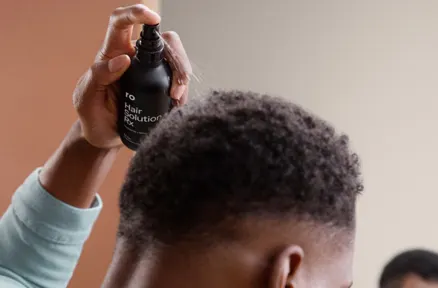Here's what we'll cover
Here's what we'll cover
It’s normal to shed up to 100 hairs per day without noticing any changes to how thick your hair feels. But if you’ve recently gone under general anesthesia for a medical procedure and have noticed a few more hairs than normal in the shower drain or on your brush, you may be wondering, “Does anesthesia cause hair loss?” The short answer is: It might.
This article discusses how surgery and anesthesia could impact hair growth and details some ways to manage post-anesthesia hair loss.
Can anesthesia cause hair loss?
There’s not a lot of research on the link between anesthesia—the use of medicines to prevent pain and discomfort during medical procedures—and hair loss. But we do know that stress can cause temporary hair loss, and surgery, often done under general anesthesia, can put you under a lot of physical and emotional stress. So when we talk about anesthesia and hair loss, it probably makes more sense to think of it as post-surgery hair loss instead of post-anesthesia hair loss.
The good news is that a surgical procedure doesn’t always cause hair loss; most of the time, hair loss following anesthesia and surgery is temporary. It’s typically a form of hair loss called telogen effluvium (TE).
What is telogen effluvium?
Telogen effluvium occurs when there is excessive hair shedding, and an increased number of hair follicles are in a so-called resting phase. Here’s what that means:
While your hair follicles aren’t always growing (they move through a cycle of growth, resting, and shedding), usually about 90% of the hair follicles on your scalp are in the growth phase, and only about 10% are in the resting phase, which ends with the hair falling out (Asghar, 2020). In people with telogen effluvium, more hair than usual enters the resting and shedding phases (Hughes, 2021).
Things that prematurely trigger hair follicles to go into the resting phase include sudden stress on the body, such as surgery, certain medications, illnesses like COVID-19, and mental stress. It can take 2–3 months after the hair follicles are triggered into an early resting phase to notice any unusual hair loss because the hairs won’t be immediately shed.
Fortunately, TE is usually a temporary condition. In most people with acute telogen effluvium, the condition resolves after less than six months, and normal hair growth returns (Asghar, 2020). It’s possible the symptoms of hair loss could return if triggered again, like after having another surgery.
Things that can cause TE after surgery
Here are some of the possible causes of hair loss after surgery:
Stress
Both physical and emotional stress are factors that can cause TE. Stress on the body, like serious illnesses or major surgery, can trigger hair follicles to move from the growth phase into the resting phase. Similarly, psychological or emotional stress can cause TE (Grover, 2013).
The good news is reducing physical and mental stress usually allows the hair follicles to return to normal hair growth cycles and new hair growth (Grover, 2013).
Side effects of medications
Hair loss can be a side effect of multiple medications, including some medications prescribed to you after surgery. Besides TE, some medications can also cause another type of hair loss, called anagen effluvium, which not only affects the hair on your head but can also impact eyebrows, eyelashes, and body hair.
Common medications that may cause different forms of hair loss include (Asghar, 2020):
Anticoagulants (blood thinners)
Beta-blockers
ACE inhibitors
Anti-seizure medications
Some antidepressants
Oral contraceptive pills (birth control pills)
If you notice any changes in hair growth a few months after starting or adjusting a medication, talk with your healthcare provider.
Type of surgery and recovery period
While any surgery could trigger TE and hair loss, procedures to the head could be more likely to cause hair loss because the trauma and stress from the surgery directly affect the skin and hair follicles on the scalp (Davies, 2012).
If your surgery requires a longer recovery period that involves staying in bed or not moving the head as often, you could be more likely to experience some hair loss, as well.
Lying in bed with your head resting on a pillow places pressure on the back of your scalp. If you don’t shift your head’s position, this pressure can change blood supply to that area and change hair growth (Davies, 2012). This type of hair loss is called positional alopecia or pressure alopecia.
Will hair loss from anesthesia grow back?
Yes, in most cases, TE is only temporary, and your hair will grow back. Anesthesia and surgery aren’t known to cause permanent hair loss, like male pattern baldness. However, for some people, other factors could slow or prevent the return of normal hair growth, like some medical conditions or genetics.
How to treat hair loss from surgery
If you’re anxious to see your hair return to normal, the tips below may help speed up the process.
Reduce stress
Both physical and emotional stress can impact hair growth and TE. For most people, having surgery can be stressful. So finding ways to manage your stress levels could help prevent and treat hair loss.
Consider these tips for managing your stress levels:
Take time off of work.
Try deep breathing exercises.
Spend time with loved ones.
Eat a healthy diet.
Exercise and move regularly.
Make more time for hobbies and leisure.
Try mindfulness and meditation exercises.
Use the right shampoo and styling technique
There are no shampoos or other products to directly treat TE. However, good-quality shampoos and techniques can help protect your hair.
Hair products containing certain chemicals, like sulfates or bleach, may damage your hair follicles, making it more likely that you’ll experience hair loss (Mysore, 2019; Bloch, 2019). When applying your shampoo, try to be gentle with your hair and be sure to rinse thoroughly.
Maintaining healthy styling habits can also help prevent hair loss. That includes avoiding high heat on your hair, like curling irons.
Hair loss treatments
Minoxidil, also known as Rogaine, is a topical treatment applied directly to your scalp to stimulate hair regrowth. It is approved for men and women with androgenic alopecia (aka male pattern hair loss or female pattern hair loss).
Some people may decide to try minoxidil for TE, but so far, there is no solid scientific evidence that minoxidil improves the recovery of TE hair loss (Hughes, 2021). Still, in theory, it could help support hair growth, and some people may prefer actively doing something to try to help.
Oral Minoxidil Important Safety Information: Read more about serious warnings and safety info.
How to prevent hair loss after surgery
Be sure to talk with your healthcare provider before surgery if you’re concerned about hair loss after an upcoming procedure. They can provide tips and discuss other preventative measures to help prevent post-surgical hair loss.
Unfortunately, not all hair loss is preventable. Still, you may be able to lower your risk for hair loss after surgery and support your overall wellness by (Asghar, 2020):
Managing emotional stress with relaxation techniques like deep breathing or talking with loved ones
Exercising regularly to help keep your body healthy
Getting enough sleep to help your body heal after surgery and maintain your health
Eating a healthy diet full of vitamins and minerals to prevent any deficiencies; this helps ensure your body has all of the fuel it needs to grow hair and help you heal after surgery.
Anesthesia and hair loss: the bottom line
If you’ve had surgery and were under general anesthesia within the past few months and start experiencing thinning hair, it’s possible TE is the cause. Talk with your healthcare provider about any questions or concerns you have if you experience hair loss after surgery.
DISCLAIMER
If you have any medical questions or concerns, please talk to your healthcare provider. The articles on Health Guide are underpinned by peer-reviewed research and information drawn from medical societies and governmental agencies. However, they are not a substitute for professional medical advice, diagnosis, or treatment.
Asghar, F., Shamim, N., Farooque, U., et al. (2020). Telogen effluvium: a review of the literature. Cureus , 12 (5), e8320. doi:10.7759/cureus.8320. Retrieved from https://www.ncbi.nlm.nih.gov/pmc/articles/PMC7320655/
Bloch, L. D., Goshiyama, A. M., Dario, M. F., et al. (2019). Chemical and physical treatments damage Caucasian and Afro-ethnic hair fibre: analytical and image assays. Journal of the European Academy of Dermatology and Venereology , 33 (11), 2158–2167. doi:10.1111/jdv.15761. Retrieved from https://pubmed.ncbi.nlm.nih.gov/31237371/
Davies, K. E. & Yesudian, P. (2012). Pressure alopecia. International Journal of Trichology , 4 (2), 64–68. doi:10.4103/0974-7753.96901. Retrieved from https://www.ncbi.nlm.nih.gov/pmc/articles/PMC3500075/
Grover, C. & Khurana, A. (2013). Telogen effluvium. Indian Journal of Dermatology, Venereology, and Leprology , 79 , 591-603. doi:10.4103/0378-6323.116731. Retrieved from https://ijdvl.com/telogen-effluvium/
Hughes, E. C. & Saleh, D. (2021). Telogen Effluvium. StatPearls . Retrieved from June 4, 2022 from https://www.ncbi.nlm.nih.gov/books/NBK430848/
Mysore, V., Parthasaradhi, A., Kharkar, R. D., et al. (2019). Expert consensus on the management of Telogen Effluvium in India. International Journal of Trichology , 11 (3), 107–112. doi:10.4103/ijt.ijt_23_19. Retrieved from https://www.ncbi.nlm.nih.gov/pmc/articles/PMC6580807/










